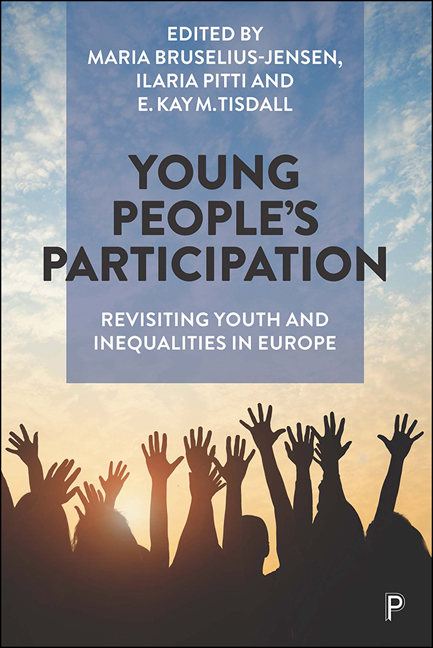Book contents
- Frontmatter
- Contents
- List of figures and tables
- Notes on contributors
- Acknowledgements
- 1 Revisiting young people's participation: an introduction
- PART I Young people's experiences of participation and engagement
- PART II Current state and conditions for young people’s participation: critiques and trends
- PART III Broadening participation: young people's own approaches to participation
- PART IV New opportunities for young people's participation: facilitating new forms of youth participation
- Index
15 - Playful walks: a methodological approach for analysing the embodied citizenship of young people in the countryside
Published online by Cambridge University Press: 18 December 2021
- Frontmatter
- Contents
- List of figures and tables
- Notes on contributors
- Acknowledgements
- 1 Revisiting young people's participation: an introduction
- PART I Young people's experiences of participation and engagement
- PART II Current state and conditions for young people’s participation: critiques and trends
- PART III Broadening participation: young people's own approaches to participation
- PART IV New opportunities for young people's participation: facilitating new forms of youth participation
- Index
Summary
Working with visual and playful multimedia methods, this chapter focuses on what this approach can offer youth studies and qualitative research. The research, which took place in summer 2017 in a rural town in the UK, aimed to explore how young people in the countryside engage with their localities through the visual and the non-verbal. By understanding playfulness as subversion (Bakhtin, 1984; Sutton-Smith, 2009), the chapter foregrounds a way to access forms of participation outside institutional, state activity. The chapter seeks to subvert the over-focus of youth research on urban experience, producing a deeper narrative of youth citizenship in the countryside. Analysis shows how these methods reconfigure the power relationships between them and the researcher by offering greater scope for autonomy within the research process. The multimedia methodology also affords the opportunity to reveal its processes to readers without hiding their complex, messy and infinite nature. Instead, the methodology foregrounds the richness of that complexity (Glaser and Strauss, 1978).
Key findings
• Youth research has an over-focus on urban experience. Reassessing constructions of the rural and its relationship with the urban produces a fuller understandings of youth experience.
• Working with visual and playful multimedia methods is a way to produce new knowledge of embodied/non-verbal/visual experiences of young people.
• Academic writing produces compressed narratives of qualitative research that hide the complex, messy, rich and infinite nature of qualitative studies. Multimedia outputs challenge this compression and offer the chance for the reader/viewer to take an active role.
Introduction
Through the presentation and analysis of a series of participatory workshops that took place in the summer of 2017 in a rural town in the UK, the chapter aims to discuss the contribution that visual and playful multimedia methods offer to youth studies and, more generally, to qualitative research. In particular, the chapter shows how these methods allow for a deeper understanding of young people's experience, providing them with means of expressions other than words. Second, the analysis shows how these methods increase the possibility for young participants to exercise their agency during the research process, restructuring the relationships of power between them and the researcher.
- Type
- Chapter
- Information
- Young People’s ParticipationRevisiting Youth and Inequalities in Europe, pp. 255 - 274Publisher: Bristol University PressPrint publication year: 2021



